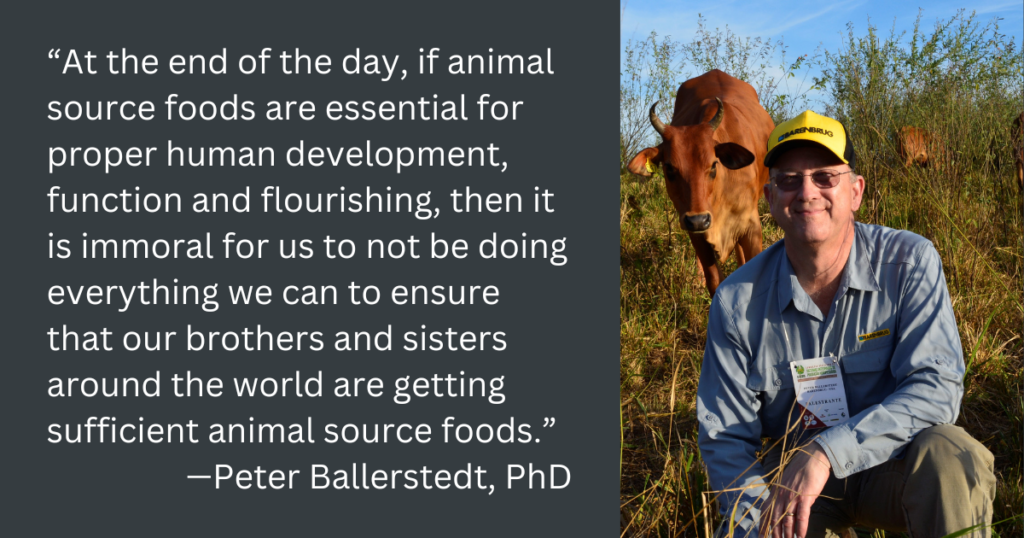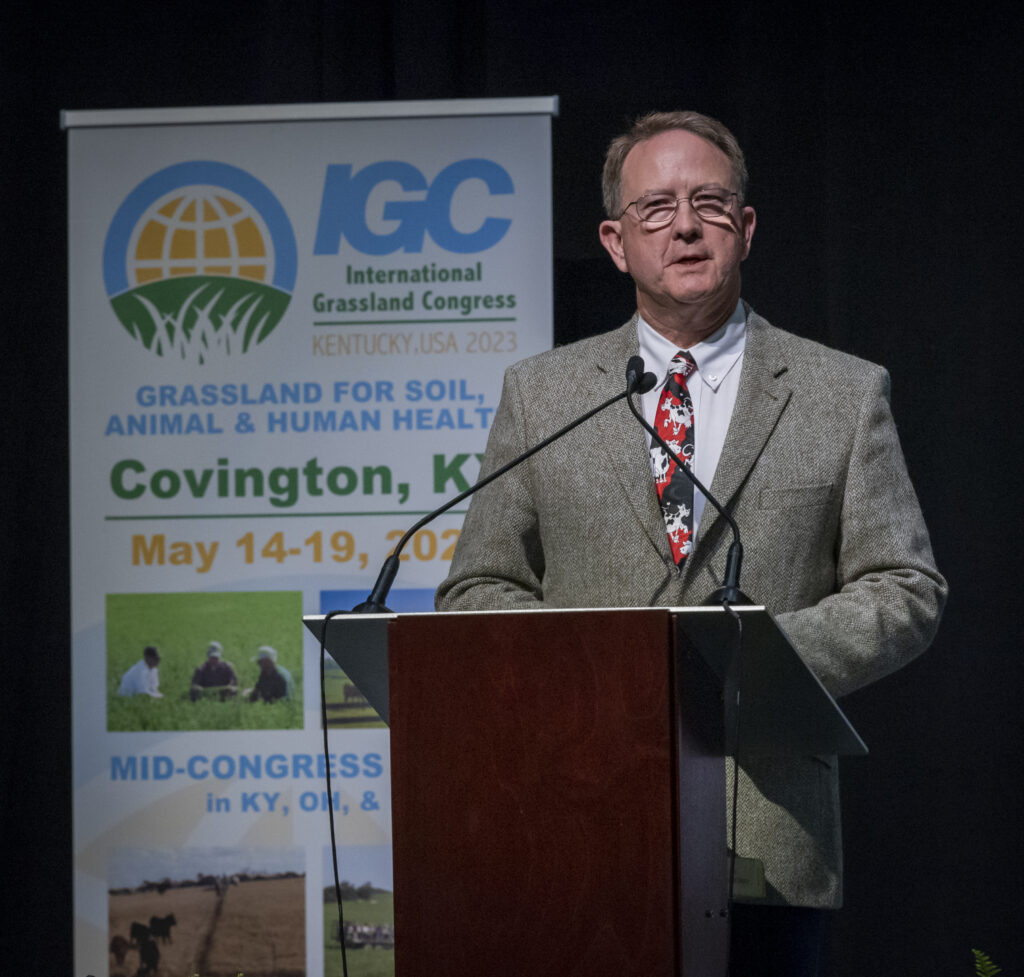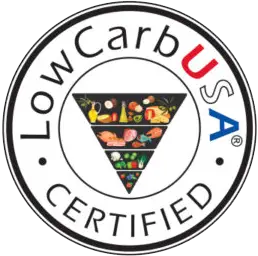Peter Ballerstedt, AKA “The Sodfather” to Present at 8th Annual San Diego Symposium for Metabolic Health (SMH)
It is with great enthusiasm that we announce the confirmation of Peter Ballerstedt, PhD (AKA “The Sodfather”) as a presenter at the 8th Annual San Diego Symposium for Metabolic Health (SMH), to be held August 17-20, 2023.
Peter, who has dedicated his career to reshaping our understanding of nutrition, human health, and the vital role of animal source foods, will deliver a presentation entitled “Regenerating Public Health: Bridging the Gap Between Metabolic Health and Ruminant Agriculture.”
Peter’s own personal experiences with therapeutic carbohydrate reduction, dating back to 2007, led him to re-examine human diet and health. What he has learned doesn’t agree with the advice that has been given by the mainstream nutrition and medical community for the past several decades.

With a background in forage science and extensive experience in the agricultural industry, Peter brings a unique perspective to the ongoing conversation surrounding metabolic health and sustainable food systems. As the President of the American Forage and Grassland Council and an esteemed speaker at numerous national and international events, Peter is a leading advocate for ruminant animal agriculture and for the essential role of animal source foods in the human diet.
Peter strives to build bridges between producers, consumers, and researchers across a wide variety of scientific disciplines – increasing awareness of metabolic health and ruminant animal agriculture’s essential role in social, economic and ecological sustainability.
Rethinking Diet and Health
Peter’s personal journey of transformation more than 15 years ago through his discovery of therapeutic carbohydrate reduction has served as a catalyst for his mission.
“In 2007, I was 51 years old, balding, obese, and pre diabetic,” Peter recalls, laughing. “Today, I’m just balding.”
More importantly than his sustained weight loss, Peter achieved improved metabolic health, resolving his blood sugar excursions and prediabetes, without relying on pharmaceutical interventions. His success challenged the prevailing narrative surrounding nutrition and propelled him to explore the symbiotic relationship between human health and animal source foods.
Peter emphasizes the importance of lifestyle intervention and its positive effects on health, stating, “I want people to learn about the lifestyle intervention, the power of it, I think it’s just such tremendous good news.” He mentioned being influenced by experts like Dr. Ben Bickman (who has presented at many past Symposiums) and many others who highlight the significant association between chronic diseases and hyperinsulinemia and insulin resistance.
Peter expressed frustration with the vilification of ruminant animal agriculture and its products. “Animal foods have been vilified as the cause of chronic diseases. We’ve all been told to eat less meat, less saturated fat, and it turns out, there are strong reasons to believe that that was not correct.”
Peter encouraged individuals to consider alternative metrics for measuring health beyond traditional markers like body weight and LDL cholesterol. He stressed the significance of metabolic health and the need for better understanding of metabolic health among the general population.
“There is a great need for a paradigm shift in the understanding of nutrition, the role of ruminant animal agriculture, and the importance of personalized health as a starting point for meaningful conversations about regenerating public health,” said Peter.
He discussed the critical importance of animal source foods in the global diet, saying “Humanity’s existential crisis is a lack of animal source food in our diet, globally.” He pointed out the impact of this deficiency on childhood development in many countries and the growing number of women of childbearing age experiencing anemia in high-income countries.
“We need to make animal source foods affordable, accessible, and appropriate for the populations they aim to reach,”said Peter, while acknowledging the importance of ensuring profitability for producers, stating, “There’s no sustainability without profit.”
Peter outlined three primary points he believes must be acknowledged:
- First, he stated that animal source foods are essential to public health because of the essential amino acids/proteins that they provide. The essential building blocks to our cells and muscles.
- Second, he emphasized that livestock agriculture, especially ruminant animals, is crucial for a sustainable food system.
- Finally, he noted that animal source foods are deeply rooted in cultural heritage and family traditions, highlighting the need to respect diverse dietary practices.
Debunking Misconceptions About Animal Source Foods
Peter expressed concern over the restriction of animal source foods, referring to it as a form of imperialism from wealthy countries and individuals. Peter emphasized the importance of focusing on essential nutrition and metabolic health as priorities.
He urged people to not be distracted by arguments suggesting that animal sourced foods are not good for the planet.
“The strongest message I can give people is to focus on improving your own health, the health of your loved ones, the health of your patients,” said Peter. “Don’t worry about these other arguments, because as it turns out, probably the most impactful and practical thing you can do to improve the world is to improve your own health, or the health of your loved ones, or the health of your patients.”
“At the end of the day, if animal source foods are essential for proper human development, function and flourishing, then it is immoral for us to not be doing everything we can to ensure that our brothers and sisters around the world are getting sufficient animal source foods.”
Peter addressed the misconception of feed-food competition, stating that 96% of the feed consumed by the global ruminant herd is not human-edible and is crucial for converting inedible biomass into high-quality food for humans. He also addressed the issue of land use, clarifying that agricultural land, including livestock, is often mistakenly equated with cropland, which accounts for a smaller portion. He emphasized the valuable contribution of ruminants in upcycling resources.
Regarding sustainability, Peter urged consideration of environmental, economic, and societal factors beyond greenhouse gas emissions. He highlighted the significant cost of chronic diseases on healthcare systems and society, pointing out that improving individual health and reducing medication use could have a much larger impact than shifting dietary choices.
Peter emphasized the essential role of animal source proteins in the human diet and challenges misconceptions surrounding plant-based proteins. He believes that animal source foods provide crucial nutrients necessary for optimal health and development. Peter highlights the importance of animal proteins in addressing malnutrition globally, as they offer a higher quality and more bioavailable source of essential amino acids. He advocates for making animal source foods affordable and accessible to diverse populations.
While recognizing the value of plant-based proteins, Peter cautions against the belief that they are equivalent to animal proteins in terms of nutrition and bioavailability. He challenges the idea that a pound of protein from plants is equal to a pound of protein from animals, highlighting the nutritional differences and unique benefits offered by animal source proteins, and their absorbability.
Overall, Peter Ballerstedt emphasized the need for a comprehensive approach to nutrition, sustainability, and public health, recognizing the essential role of animal source foods and the importance of personal health as a catalyst for positive change.
Building Bridges
Peter discussed the challenge of persuading individuals with different perspectives on the conversation. He acknowledged that not everyone will be easily convinced, but his goal is to provide information and resources that may influence their decisions in the future. Peter highlighted the importance of affordability and encouraged individuals to buy what they can afford without worrying about specific label claims.
Peter reflected on the importance of sharing information and breaking down silos between different communities. He believes there is tremendous good news to be shared but acknowledged that the collective effort needs improvement in effectively communicating it.
The Importance of Attending a Symposium
When asked about the benefits of attending a Symposium for Metabolic Health, Peter emphasized the importance of finding a sense of community and support, especially for those who are new to the metabolic health space in their personal journey.
“It’s really good to know you’re not alone,” said Peter. It’s important to be able to build your community, because you’re gonna go back home and unless you’re really fortunate, you’re not likely to find this kind of a community of people who are interested in the same things and going in the same direction.”
Peter highlighted the interactive nature of the symposium, where participants have the opportunity to engage with and learn from the speakers and experts.
“First of all, you’re a participant, not just an attendee,” said Peter. “This is not one of those conferences where you go, and the speakers are brought up front, separated by velvet ropes, to keep you from interacting. That’s not the way this happens. At these conferences, you have access to all these amazing human beings that you can talk with, learn from, and ask your questions.”

Peter discussed the first time he got to see Gary Taubes (who will be presenting again in San Diego) in person, and how impressed he was to be able to meet, ask questions and engage with the best-selling author and researcher.
“It’s wonderful to be able to interact with leaders in this community. It’s important to see that the presenters are human beings just like you and me.”
For professionals considering attending the symposium, Peter encouraged them to reflect on the state of their patient population and their own well-being.
“Are your patients getting healthier, or are you seeing a downward trend? Are you approaching burnout? Is your family suffering? If you don’t like the answers to those questions, maybe it’s time to change that. Your life doesn’t get better by chance, it gets better by choice.”
Peter said he was confident that those who decide to attend a Symposium will derive many lasting benefits. “Overall, attending the Symposium for Metabolic Health provides an opportunity to find support, connect with experts and peers, gain knowledge, and evaluate one’s own professional and personal well-being in the context of metabolic health.”
8th Annual SMH – San Diego, August 17-20, 2023
Attendees of this year’s Symposium will have the opportunity to learn about the use of carbohydrate reduction in addressing, and even reversing, type 2 diabetes, hypertension, fatty liver, PCOS, CVD, autoimmune conditions; epilepsy, TBI, Alzheimer’s, and other neurological pathologies,including mental health conditions and much more.
This year’s conference will also include a very special session dedicated to presentations regarding the connection between cancer and metabolic disease, and will educate practitioners and laypersons about metabolic therapies that may improve outcomes in addition to traditional treatments, and how they may make them more effective, with less side effects.
For those interested in delving into the extensive evidence supporting carbohydrate reduction as a therapeutic intervention, and discovering ways to improve one’s metabolic health through lifestyle changes, the Symposium for Metabolic Health in San Diego is slated for August 17-20, 2023.
The SMHSD2023 is open to the public and technical enough for the healthcare professional and the scientist. This is an accredited CME/CPD event.
We encourage you to sign up for the livestream even if you can’t attend in person. The connections made even through the chat application, and the opportunity to watch inspiring, informative lectures from your own home or office, are incredibly valuable. We may even have a chance to squeeze in your online questions into the Q&A if time allows.
Plus, everyone registered, whether in person or livestream, gets access to replays for an unlimited time. So in case you miss anything live, you will have the ability to view and review at any time.
Save 10% on tickets, low-carb meals, and optional CME credits with code: July10 (discount expires after July 31).


